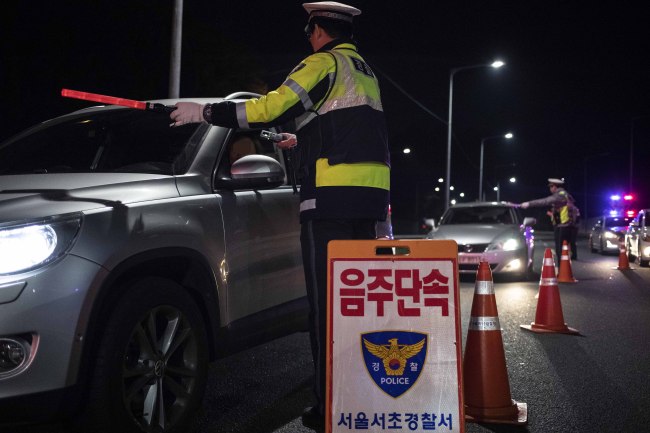DUI offenders caught 3 times subject to stricter punishment: Supreme Court
By Jo He-rimPublished : Dec. 2, 2018 - 16:58
Under the law, a drunk-driving repeat offender caught three times is subject to stricter punishment, even if not convicted, the top court said Sunday.
The Supreme Court revealed that it had overturned a lower court’s acquittal of an offender surnamed Kang, who was charged with drunk driving in February last year, his third time being caught for the offence.
The Supreme Court revealed that it had overturned a lower court’s acquittal of an offender surnamed Kang, who was charged with drunk driving in February last year, his third time being caught for the offence.

Kang, 35, was indicted for driving under the influence with a blood alcohol concentration of 0.177 percent on Feb. 27 last year. He was previously fined 1.5 million won ($1,338) for drunk driving in 2008 and is currently standing trial for another DUI case with a blood alcohol concentration level of 0.125, which occurred on Feb. 2 last year.
Kang was also indicted for beating his girlfriend and threatening to hurt her son when she asked to end the relationship.
Considering that the Feb. 27 case was his third violation of the Traffic Road Act, prosecutors argued that he should be subjected to stricter punishment.
According to the law, those found driving a vehicle while intoxicated twice or more are subject to stricter punishment -- imprisonment with prison labor for at least one year to up to three years in prison, or a fine of 5 million won to up to 10 million won.
In the first trial, the court found Kang guilty for both dating violence and multiple drunk driving offences, and sentenced him to three years in prison.
The appeals court reversed the ruling and reduced the sentence to 2 1/2 years, saying it goes against the principle of presumption of innocence -- in that it is not fair to include the Feb. 2 case as the second case of drunk driving as the trial was still ongoing.
The top court, however, overturned the lower court’s acquittal.
“The Traffic Road Act stipulates (stricter punishment) for those who were ‘found’ to have violated the act more than twice, and the words should be interpreted as written,” the top court said. “It does not mean the violation should be judged legally guilty to be an offense.”
The top court’s ruling is likely to become the standard for future rulings on drunk driving repeat offences.
Amid criticism over leniency toward drunk driving, the National Assembly passed a revision to the Road Traffic Act on Saturday, aimed at toughening penalties against first-time offenders and reinforcing standards for measuring blood alcohol concentration.
The amendment also includes imposing three years to life imprisonment for drunk driving that results in the death of a victim.
By Jo He-rim (herim@heraldcorp.com)



















![[Today’s K-pop] Treasure to publish magazine for debut anniversary](http://res.heraldm.com/phpwas/restmb_idxmake.php?idx=642&simg=/content/image/2024/07/26/20240726050551_0.jpg&u=)